Is the Modern Language Department Part of the College of Arts and Sciences
What is "Classics", and why do we study it?
At Trinity, "Classics" is studied, offset and foremost, considering ancient Greece and Rome have long been regarded equally giving nascence to values, concepts, and institutions that collectively course the basis of "Western civilization." Just past reading this, you too participate in the "classical tradition." Even today, we see the expressions of our ongoing participation in this tradition all around us:
- in the English language and in Romance languages descended from Latin as the common language of the Roman Empire;
- in the technical terminology of professions such as law and medicine that describe on both Greek and Latin;
- in narratives that draw their plots and characters from Greek and Roman myth and history;
- in arguments about the common skilful that cite authors like Plato or Cicero to address conditions in our globe today;
- in analyses of electric current events that draw upon ancient accounts of major historical events, such as the Persian Wars or the end of the Roman Democracy, and mod interpretations of these events' legacy;
- in the enduring appeal of the "classical" aesthetic in the visual fine art and architecture.
Whether through pursuit, cover, subversion, or rejection, people who reply to the legacy of classical antiquity are participants in this tradition.
At the same time as nosotros capeesh aspects of the ancient Greek and Roman worlds by exploring them in our research and courses, we as well examine how the significance of these "timeless" cultural inheritances has changed over time, in the eyes of different audiences in different places. This dynamic human relationship between "classical antiquity" and its various audiences has produced a variety of positions on how the legacy of classical antiquity should be valued, as the values of contemporary society modify and access to ownership over that cultural legacy has grown.
By creating a disquisitional distance from classical artifact, in gild to better study how its pregnant has inverse over time, we can also sharpen our understanding of the historical realities of the fourth dimension flow that the modern concept of "classical antiquity" contains (roughly 1000 BCE to 500 CE). Equally nosotros skin back centuries of accumulated appreciation of "Hellenic republic" and "Rome," we re-examine the underlying material with the best interpretive tools we now have. We also widen our perspective to encompass the study of cultures and societies in areas that are not fundamental to the narrative of Western classical tradition, simply are very much part of the shared Mediterranean earth, such as the Silk Road, North Africa, Arab republic of egypt, Mesopotamia, Phoenicia, and State of israel. Every summer, our students take the opportunity to excavate with Professor Martha Risser at the Tel Akko field schoolhouse in Israel.
Trinity's Classical Studies Department – in collaboration with faculty from beyond the humanities, social sciences, natural sciences, and arts divisions – offers a wide spectrum of courses that explore the globe of classical artifact and its modern legacy through the study of languages, literature and motion-picture show, philosophy, political theory, visual art, history, architecture, and archeology. This stimulating exposure to the latitude of the liberal arts prepares our majors well for life after college. A survey of alumni from the last 10 years indicates that they are successfully engaged in law, medicine, publishing, and education at both the secondary schoolhouse and higher levels, religion, business, social piece of work, and journalism. Employers know: a student who completes a degree in Classical Studies has the intellectual power, discipline, and breadth of interest to excel at annihilation.
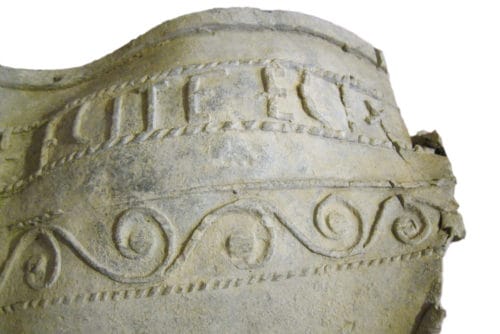
The professional organizations of the Classical Studies customs are standing upwardly for the rights of Blackness Americans to exist treated with the same dignity and respect owed to all members of our lodge. Please encounter the argument of our national organization, the Society for Classical Studies, linked below.
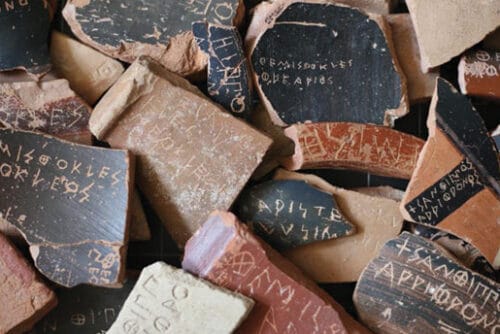
A lecture hosted by the Department of Classical Studies and featuring James P. Sickinger, Salutatorian of Trinity Form of 1986, Associate Professor of Classics at Florida State University. Ostracism was a form of temporary exile that allowed ancient Athenian citizens to vote into temporary exile powerful individuals thought to pose a threat to their democracy. The practice took its name from the potsherds—ostraka—onto which voters scratched the names of those persons they wanted to banish. Excavations in Athens have uncovered thousands of these inscribed ballots over the past century, and their study has provided new and often unexpected details not only about ostracism but also about its intended victims and even the literacy of aboriginal Athenian voters. This lecture discusses some of this material and examines how ongoing excavations and recent publications continue to revise and enhance modern understanding of ostracism and Athenian voting methods. Sponsored past the Classical Studies Department and the Archaeological Institute of America, Hartford Chapter.
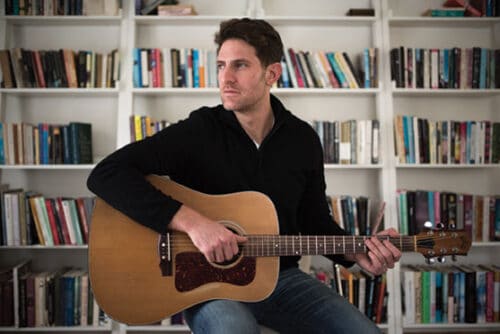
Joseph Goodkin of Quell Records, Inc. will present a webinar titled "Joe Goodkin's Odyssey". Joe will perform original compositions based on Homer's ballsy poem, The Odyssey accompanying himself on audio-visual guitar. Also Joe volition perform some of his new work based on Homer'south epic verse form, The Iliad.
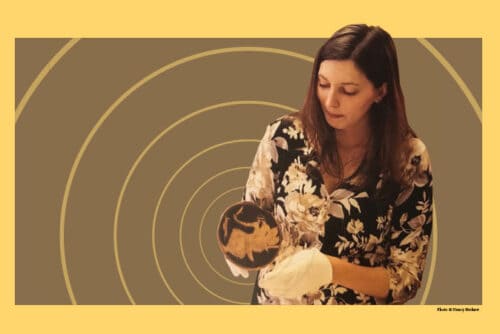
A lecture by Danielle Smotherman Bennett, curatorial assistant for the Menil Collection in Houston, Texas. Music features as an important component in a variety of ancient Greek mythological tales, including those portrayed on vases. Athenian vase paintings, however, are a silent medium. This talk demonstrates how images regularly incorporate sound through visual clues inviting viewers to imagine these sensory aspects and how vase painters visually express in different ways music, oral communication, and other sounds within representations of tales such as Orpheus and Marsyas, among others. Visual markers of sound, such as the inclusion of instruments, figures with an open mouth, and fifty-fifty nonsense inscriptions can entice viewers to relate the depiction with noises an ancient audience would expect. Through engaging the work of scholars and musicians working to recreate aboriginal Greek music, modern viewers can gain greater insight into the visual representations on ancient ceramics. And can feel how and why ancient Greek artists inspire their audience to fill-in the details of these silent pictures.
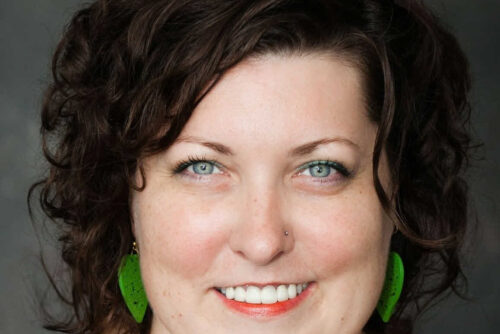
In this teaching workshop, titled "Language Choice and Equity in the Latin Classroom", Kelly volition hash out critical language awareness practices and how they tin help Latin educators develop antiracist pedagogy methods. The focus volition be on the presentation of race and enslavement in beginning Latin textbooks, but other topics will be addressed. Kelly will offset talk about the historical contexts, methods in educational linguistics, and offer sample activities. Participants will then be invited to join in equally nosotros piece of work through more passages together, make observations, and discuss antiracist curriculum development using critical linguistic communication choice practices. The purpose of this workshop is to help Latin educators develop their curriculum and provide participants with easily attainable activities for getting started. The workshop will end with a discussion of intentional action and what steps can be taken today.
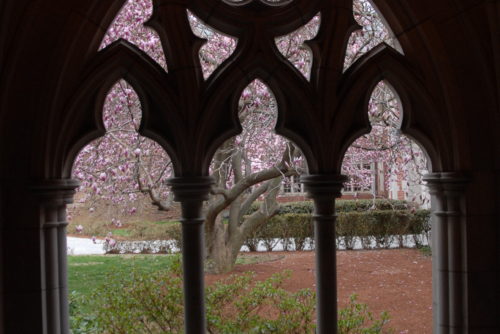
It is with keen sadness that we share the news of the passing of Jeffrey H. Kaimowitz. He was a longtime curator and director of the Watkinson Library, and sometimes taught Latin courses in the Section of Classical Studies. He passed away on Nov ix, 2020.
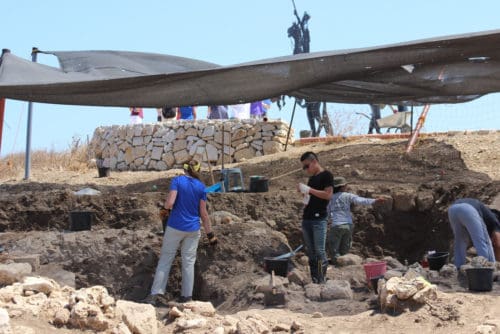
The Trinity College Summertime Field School: Archeology, Conservation, and Heritage Plan in Akko, Israel, offers a four-week program focused on the essentials of archaeological fieldwork, conservation, and heritage direction.
Source: https://www.trincoll.edu/classical-studies/
0 Response to "Is the Modern Language Department Part of the College of Arts and Sciences"
Post a Comment